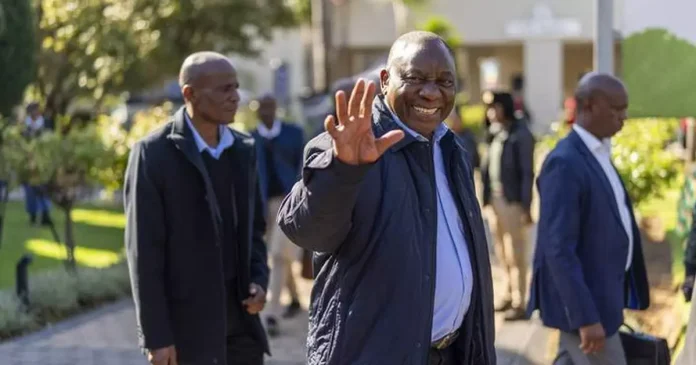The leader of South Africa’s Inkatha Freedom Party (IFP) stated he would join the proposed national unity government, according to AP News.
The move could break the country’s political deadlock after the long-ruling African National Congress (ANC) lost its parliamentary majority in elections last month.
Velenkosini Hlabisa’s statement means an agreement between some of the main parties to form a coalition government with the ANC is becoming more likely ahead of the deadline. On Friday, South Africa‘s new parliament will meet for the first time since the 29 May election in an attempt to elect a new president.
The ANC has been the ruling party for 30 years since the end of the apartheid system of white minority rule in 1994. However, the party received only 40 per cent of the vote in this election. It now needs to strike a deal with others to govern and re-elect President Cyril Ramaphosa for a second and final term.
South Africans vote for parties in national elections and win seats in parliament according to their share of the vote. Lawmakers then elect the president of Africa’s most industrialised country.
Last week, the ANC proposed forming a government of national unity instead of a narrower coalition with one or two parties. It invited all 17 other parties represented in parliament to be part of it. However, some refused.
Hlabisa indicated that the IFP was ready to join a unity government that included the ANC and the Democratic Alliance, South Africa’s main opposition party.
Fragile unity
The Democratic Alliance has also signalled that it is ready to join a unity government, but has not made a definitive statement. Negotiations with the ANC are ongoing.
Meanwhile, two other major parties, the Economic Freedom Fighters and the new MK Party of former President Jacob Zuma, have refused to join the unity agreement. The MP filed court papers demanding that the first sitting of Parliament be stopped. He also objected to the election results, alleging irregularities.
South Africa’s Independent Electoral Commission acknowledged logistical problems and noted the objections of several parties. However, the commission officially announced the results on 2 June, saying the election was free and fair.
The MK stated that 58 new MPs would not attend parliament if the sitting took place on Friday. However, South Africa’s constitution states that only one-third of parliament’s 400 lawmakers must be present for a quorum, and the vote to elect the president will go ahead.
